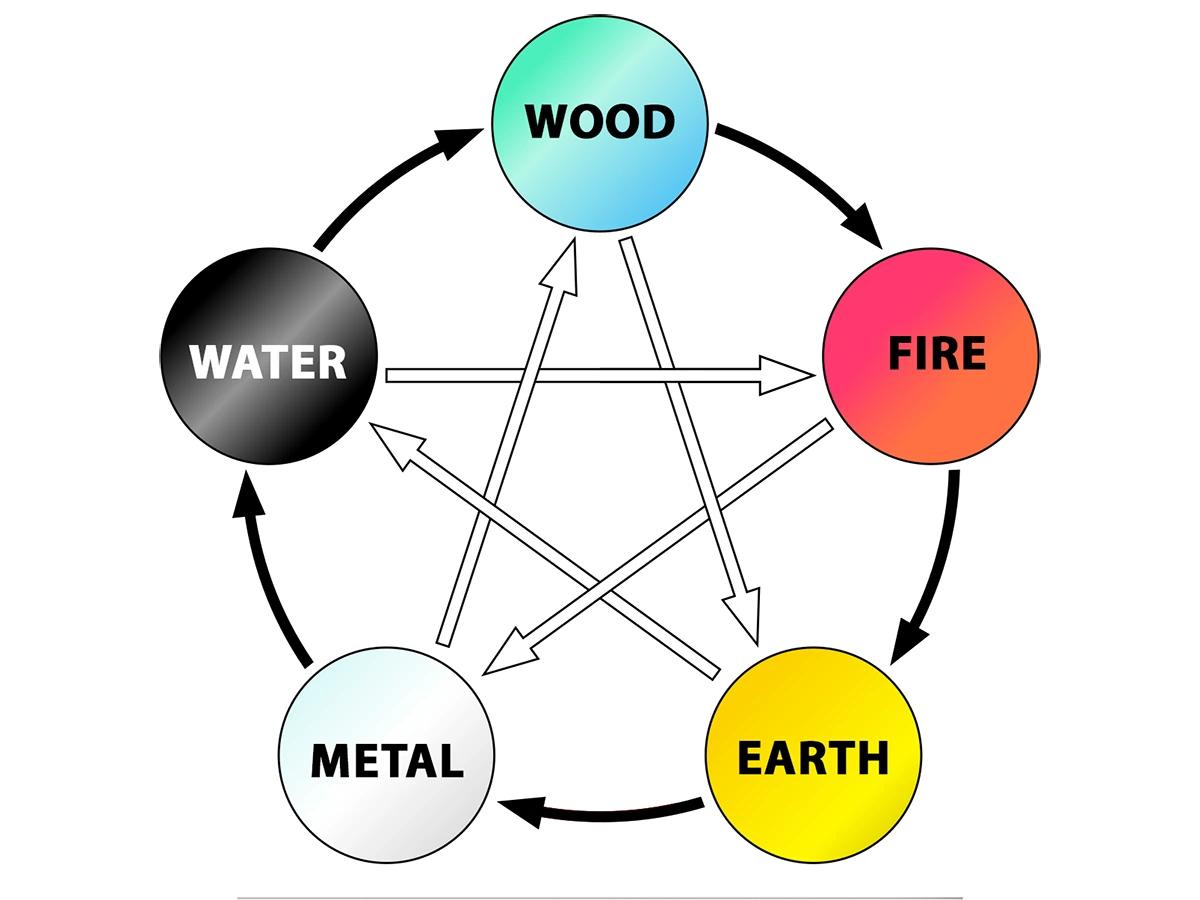Feng shui operates on several foundational concepts that guide its application:
1. Qi (Life Force Energy)
Qi is the vital energy that flows through all living things and spaces. In feng shui, the goal is to ensure qi moves freely without stagnation. Cluttered spaces block qi, leading to feelings of stress or stagnation, while open, well-organized spaces allow qi to flow, fostering vitality and peace.
2. Yin and Yang
Yin and yang represent complementary opposites—dark and light, soft and hard, passive and active. Feng shui seeks to balance these forces in a space. For instance, a room with too much yang (bright lights, bold colors) may feel chaotic, while too much yin (dark, cramped spaces) can feel oppressive. A harmonious balance creates a calming, energizing environment.
3. The Five Elements
The Five elements: wood, fire, earth, metal, water are central to feng shui. Each element corresponds to specific qualities, colors, shapes, and areas of life:
- Wood: Growth, vitality; green, columnar shapes; associated with family and wealth.
- Fire: Passion, energy; red, triangular shapes; linked to fame and reputation.
- Earth: Stability, nurturing; yellow, square shapes; tied to health and knowledge.
- Metal: Clarity, precision; white, circular shapes; connected to helpful people and children.
- Water: Flow, wisdom; black, wavy shapes; related to career and life path.

Balancing these elements in a space enhances specific life aspects. For example, adding a water fountain (water element) in the career area of your home can support professional growth.
4. The Bagua Map
The bagua (meaning “eight areas”) is a feng shui energy map that divides a space into eight sections, each tied to a life aspect: wealth, fame, love, family, health, children, knowledge, career, and helpful people. The ninth area, the center, represents overall well-being. By overlaying the bagua on a floor plan, you can identify areas to enhance with specific colors, elements, or objects.
5. Commanding Position
The commanding position refers to placing key furniture (e.g., bed, desk, or stove) in a spot that offers a clear view of the room’s entrance, ideally diagonal to the door. This placement fosters a sense of control and security, as it allows you to see who enters without being directly in the door’s path.
The Role of Feng Shui in Modern Life
Feng shui offers practical benefits for enhancing well-being and achieving goals:
- Improved Well-Being: A well-arranged space with balanced qi promotes relaxation and mental clarity. For example, a clutter-free bedroom with soft lighting enhances sleep quality.
- Enhanced Prosperity: Positioning a workspace in the wealth area of the bagua or using wealth-related elements (e.g., purple decor, wood elements) can attract financial opportunities.
- Strengthened Relationships: Adjusting the love and partnership area with yin-earth elements like pink or square shapes can foster harmony in relationships.
- Environmental Harmony: Feng shui encourages sustainable design, such as preserving natural landscapes or maximizing natural light, aligning with modern ecological principles.
While feng shui doesn’t guarantee wealth or health, it supports creating environments that align with your goals and aspirations.
Is Feng Shui a Science or Superstition?
Feng shui blends practical environmental wisdom with metaphysical beliefs. Its roots in choosing flood-safe sites or sunlit homes reflect scientific observation, while concepts like qi and long-term fortune carry spiritual elements. Critics label it pseudoscience due to untestable claims, yet its environmental insights align with modern landscape ecology.
For example, feng shui’s emphasis on preserving “feng shui woods” has helped maintain biodiversity in Asia.
A skilled feng shui practitioner combines empirical knowledge with intuitive understanding, ensuring applications are practical and meaningful. While not a cure-all, feng shui offers a framework for intentional living and environmental harmony.
Conclusion
Feng shui is a time-tested practice that harmonizes human spaces with natural energies, promoting balance, prosperity, and well-being. By understanding its principles—qi, yin and yang, the five elements, the bagua, and the commanding position—you can transform your home or workplace into a supportive environment. Whether you’re decluttering, rearranging furniture, or selecting colors, feng shui empowers you to create spaces that align with your goals.

